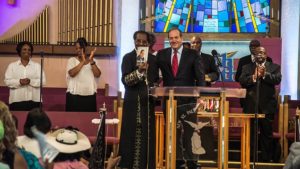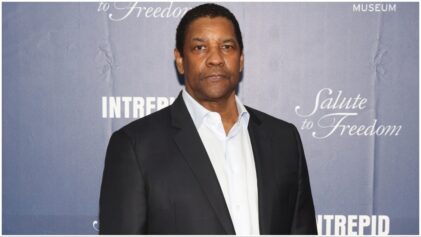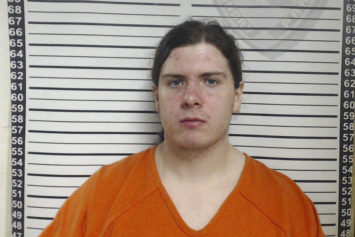Black pastors who are part of evangelical fundamentalist Christianity are mobilizing support for Israel to block President Obama’s nuclear deal with Iran, citing Jewish support for the civil rights movement. Is following the lead of white, rightwing evangelicals the best use of their time and resources, or should they seek justice and economic empowerment in the Black community?
As the Detroit Free Press reported, nine metro Detroit pastors from Church of God in Christ (COGIC) are in Israel for a week-long trip organized by the International Fellowship of Christians and Jews, a Chicago-based organization that has courted support from Christian evangelicals who support Israel.
“The Jewish community and the African-American community were really the strongest allies in the 1960s,” said Rabbi Yechiel Eckstein, leader of IFCJ. “Jews marched in the civil rights movement. My rabbi was hand in hand with Dr. King. Two young Jewish boys were killed.”
Eckstein told the Free Press that his organization has raised almost $1.25 billion from evangelical Christians in support of Israel, and hopes to drum up Black opposition to the Iran deal.
“We want to send a message… this is sort of a counterweight to that, that not everyone agrees with Sharpton,” Eckstein said.
The trip to Israel comes after 1,000 Black activists and writers wrote an open letter calling for a boycott of Israel.
Glenn Plummer, senior pastor of Ambassadors for Christ Church in Detroit and the founder of Fellowship of Israel and Black America (FIBA), hopes to revive the relationship between the Black and Jewish communities, citing Jewish participation in marches with Martin Luther King, who Plummer says was a Zionist.
“When it comes to the issue of whether we’re supportive of Israel or not, we’re very particular not to violate Scripture,” Plummer said in Charisma News in 2008.
FIBA has several chapters across the country, and an office in Israel, which is headed by Linda Olmert, daughter of the former Israeli Prime Minister.
“God promised in the Bible that whoever blesses Israel, He will bless them,” said Plummer, who believes an ongoing revival at his church is partly a result of his support for Israel. “I do believe that if we bless Jews openly, unapologetically and clearly, God is obligated to bless us.”
On the other side, faith based groups are mobilizing in favor of the Iran nuclear deal. Rev. Al Sharpton called on Black churches to support the Iran deal, as are a group of 340 rabbis, as well as Catholic bishops and Quaker groups.
As Ira Glunts of Mondoweiss, a progressive news website on Middle East policy from a progressive, anti-Zionist, Jewish perspective, reported in 2011, the pro-Israel lobby, including its largest member, the American Israel Public Affairs Committee (AIPAC), has cultivated relationships in the African-American community. That year, AIPAC sponsored a trip of 18 Black politicians to Israel, as Christians United for Israel (CUFI), founded by John Hagee, a white Christian Zionist, hosted events at Black churches.
Glunts argued that despite the positive picture often painted of historic Black-Jewish relations, there was also great conflict and division, including the expulsion of whites from the Student Nonviolent Coordinating Committee during the Black Power era.
“Despite this official rosy assessment, the true relationship between Jews and African-Americans was more accurately defined by conflict engendered in the not- always- healthy association of tenant and landlord, employer and employee or borrower and creditor, since many African-Americans encountered Jews as retailers in their communities,” he noted.
Glunts added that the pro-Israel lobby hopes to recruit “even a small group of influential African- Americans to enlist in their propaganda war, while recruiting a significant number of fundamentalists from the African American churches… in combating charges that Israel is an apartheid and racist state.”
The larger issue is whether, given the dire need for resources and services in the Black community, Black churches should concentrate their efforts in supporting a nation that already receives $3 billion in aid from the U.S. That Israel itself has many challenges facing Ethiopian Jews and refugees from other African nations—who face daily injustices including racism, poverty and police brutality—is yet another issue. The African-American community, like the African diaspora, has many struggles that need to be addressed, and the Black church, if it wanted to, could serve as a beacon for development and justice in the community.
There are some Black churches who have assumed the mantle and have dedicated themselves to racial justice and economic empowerment. However, many have not. For example, with $65 million in new corporate jet money, Creflo Dollar could do so many things for Black America, such as save HBCUs, invest in Black-owned high-tech startups, support impoverished Black families or fund the Black struggle movement. If Black churches begin to think in those terms, the bleak state of the Black community will begin to change dramatically and for the better.


